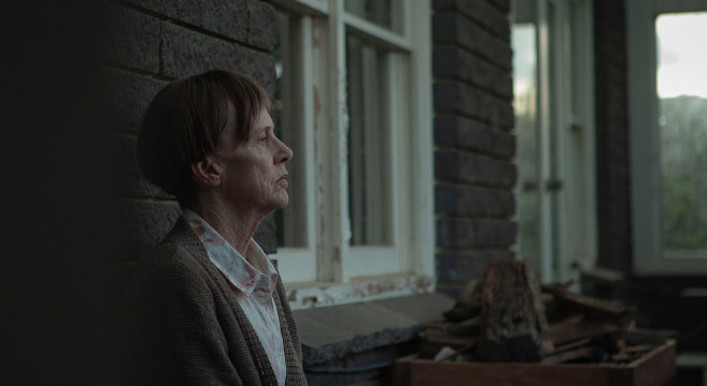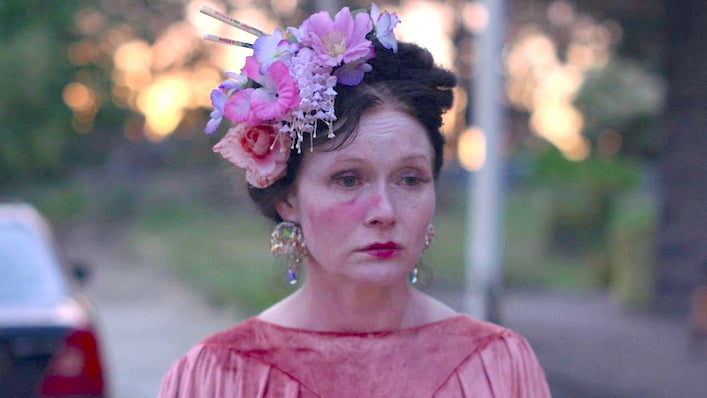Nitram is a harrowing look at the banality of evil – and the year’s best Australian drama

Justin Kurzel’s controversial attempt to make a film about the murderer behind Australia’s worst massacre has resulted in the unforgettable Nitram. Travis Johnson expounds on its soulful performances and “nightmare-like quality.”
There’s a good chance that after watching Justin Kurzel’s Nitram you’ll find yourself down the Martin Bryant/Port Arthur Massacre rabbit hole once more, delving into the minutiae of the worst mass shooting of Australian history.
Nitram leaves you, deliberately, with the need to know more, because it knows that the central questions, “Why did this happen?” and “Could it have been prevented?”, are unanswerable. But we reread and revisit and re-interrogate, because an event like that leaves deep and lasting scars in a nation’s psyche, and they still ache from time to time.
There was a bit of noise when Nitram was announced regarding the ethics around turning Bryant’s story into a movie—was it too soon? Insensitive to the needs of survivors? Exploitative? Maybe, maybe, maybe. But we were going to get a movie sooner or later, and we’re lucky we got this movie; Kurzel’s Nitram, from a script by frequent collaborator Shaun Grant, is a sublime, thoughtful, and excruciatingly empathetic look at that old sawhorse, the banality of evil.
It maps out, with some invention and smoothing of ragged edges for the purposes of dramatic presentation, Bryant’s life leading up to the very precipice of his shooting spree at the Broad Arrow Café in Port Arthur in late April, 1996. True names and identities are lightly obscured—Martin, as played by Caleb Landry Jones, is only addressed impersonally, or by the cruel schoolyard nickname that gives the film its title.
Similarly, his parents, played by Judy Davis and Anthony LaPaglia, are not specifically named: while the character of Helen Mary Elizabeth Harvey, a wealthy heiress who semi-adopted the young Bryant in a plot development that would be rejected if it were mere fiction, is played by Essie Davis as simply Helen.
But we know who these people are. If nothing else, we know that Nitram is Bryant, and as played by Jones he is fascinatingly repellent figure. Going down the Bryant rabbit hole post-viewing, a quote jumped out at me: in a 2011 interview Bryant’s mother Carleen recalled that Dr Eric Cunningham Dax, a psychiatrist evaluating her son, once said that he was unemployable if for no other reason than “…he would aggravate people to such an extent that he’d always be trouble”.

Landry nails that. Even if we can put aside our in-built knowledge of what is to come and what evil he will commit, Nitram the character is skin-crawlingly unnerving, annoying, aggravating. He has no sense of social cues or customs, no interpersonal skills. Even when he’s not acting out by letting off fireworks or other acts of spontaneous aggression or violence, he is a deeply unsettling presence: his watery eyes and slack expression communicating a repellent mix of confusion, resentment, paranoia and, occasionally, cruel amusement when some prank or action gets him attention.
Worse, however, is his neediness; we can see that he understands he’s a broken gear that doesn’t fit in the big social machine. We can feel the pain of his alienation, and it’s never sharper than when we see his fumbling, painful attempts to connect with people rebuffed, perhaps because we know we would reject him, too. We often say that an actor disappears into a role, but it’s rarely been truer here. It’s not just the physical resemblance and the accent (perfect, by the way), but the way Landry makes Nitram so alien, and yet still so pitifully human.
Another quote from the rabbit hole: Dax again, saying that Bryant “…cannot read or write. Does a bit of gardening and watches TV… Only his parents’ efforts that prevent further deterioration. Could be schizophrenic and parents face a bleak future with him.”
Kurzel and Grant, through LaPaglia and Davis, actualise that bleak future with shockingly effective economy. We don’t see Nitram’s childhood, but we can see the toll that raising him has taken on them; while she has allowed herself to become hardened by her decades-long burden, turning callous and occasionally even cruel, he has retreated into despair, unable to cope with the distance between the life he wanted and the life he lives. Davis and LaPaglia sketch their characters quickly and indelibly, letting us see decades of pain and frustration in our brief glimpse into their lives.

Arguably more of an enigma than Nitram himself is Helen, who leads a life of monied squalor in a decaying mansion filled with pets when we meet her. The heir to a lottery fortune, she is wealthy enough to live however she wants, but lacks either the will or the skill to interact with society at large in any meaningful way.
As Helen, Essie Davis imbues the character with a certain self-awareness that Jones’ Nitram lacks, but she is nonetheless a mirror for him: her wealth affording her leeway and indulgence that the impoverished Bryants lack, but her lack of socialisation still apparent. Later, after she dies in a car accident and wills her fortune to Nitram, we see how his sudden wealth opens doors for him; he can travel, he can dine out, he can buy cars… and he can buy guns.
Director Kurzel and writer Grant are no strangers to true crime, having made their bones with 2011’s Snowtown, and explored the blurred border between history and mythology with True History of the Kelly Gang in 2019. While their first feature displayed an at-times fetishistic attention to the particular details of murder, assault, and rape, it took pains to pith the psychological viscera of serial killer John Bunting and his accomplices.
Here, the crime which might have been the core of any other screen adaptation of events is sidelined. Instead we are forced to follow the step-by-step journey to the Port Arthur massacre, cursed like Cassandra with foreknowledge of what is to come, watching every opportunity for intervention pass by.

There are moments that stand out like the horseshoe nail that lost the battle in the old proverb, but the film wisely eschews pointing a finger at any one cause. It’s a holistic approach to real life horror; perhaps if any one element had been different we would not be where we are, but these people and these circumstances, however unlikely, bring about only one possible result, and we sit helplessly as we watch it come about.
That element of predestination gives Nitram a nightmare-like quality at times, but Kurzel’s eye for quotidian detail and Grant’s ear for colloquialism and authentic character keep us nailed to the reality of the story. As a result, Nitram the film not only avoids accusations of exploitation—it transcends its own genre, comparably if not similarly to the way True History of the Kelly Gang broke the boundaries of the historical drama.
In both intent and execution, Nitram is a serious and important film, and anyone who prefers to leave it unseen is well within their rights. But those open to what Kurzel and company are doing here will find a challenging, troubling, unforgettable viewing experience.




















